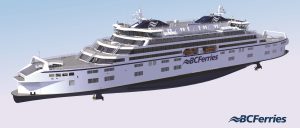
VICTORIA – BC Ferries is disappointed with the B.C. Ferries Commissioners’ announcement that only four new major vessels have been approved for the fleet, not the five that BC Ferries was hoping for.
In a press release, BC Ferries noted that the Commissioners’ decision identifies two main areas of uncertainty that are foundational to the health of B.C.’s marine highway.
“There is a systemic funding gap and significant investment is needed to deliver even the same level of service as today, either by taxpayers or customers through fare increases,” the release states, adding “There is disagreement about future traffic demand pressures and what ferry customers see as acceptable levels for waits, delays, and risks of mechanical breakdowns.”
BC Ferries President and CEO Nicola Jimenez was clear: “We’re disappointed, and obviously at odds with this decision. We put forward the strongest possible case on behalf of our customers to increase capacity and resiliency at the most affordable price.
“Our customers have been clear—they need more sailing capacity, fewer delays, and a ferry system that keeps up with demand in the coming years. While four vessels will still provide some much-needed benefits, we believe we’re missing a critical opportunity to build a more resilient transportation network for the future at a lower price now.”
BC Ferries had proposed to procure five vessels now on a fixed-price basis to add capacity and resiliency on its busiest routes to meet the needs of BC’s growing population, tourism industry, supply chains, and local economies.
Business leaders and associations expressed concern about the decision.
Dave Earle, President and CEO of the BC Trucking Association, stated “Building all five vessels wasn’t just about keeping up with demand—it would have been a smart economic investment in local jobs, our supply chain, and in British Columbia’s future. While the added ferry capacity would have moved over $240 million in additional cargo annually by 2035, instead capacity will fall behind demand even further.
“Every sailing that’s cancelled or delayed has real economic consequences—just one missed sailing can cost our industry well over $100,000. Without enough ships, those costs will only rise and it’s British Columbians who will ultimately pay the price through more expensive goods and lost economic opportunities.”
There were four key areas where the Company’s position and the Commission’s decision differed: Affordability, future demand, shifting demand and ferry system funding.
Jimenez added that “This is a missed opportunity to take advantage of fixed pricing to build five ships in a very affordable way for our customers. We fully expect shipbuilding costs and demand will continue to grow, putting even more pressure on future fares and reliable service, and may hold us back from meeting the expectations of our customers and the communities we serve.
“We’ll now reassess how we can best deliver service in the future that customers, coastal communities, and local businesses expect.”
BC Ferries states it will continue to advocate for long-term investments in the ferry system that are designed to ensure a reliable and affordable ferry service for British Columbians. It is now in the middle of a global procurement process to select the highest quality, most affordable bid for the shipyard that will build the New Major Vessels, and a decision is expected sometime this summer.
The BC Ferry Commission is an independent body separate from the provincial government and BC Ferries.
Commissioner Eva Hage, who did not approve the additional fifth vessel, stated in a press release on Globe Newswire that “Replacing the four legacy ferries will mean a much-needed increase in capacity and reliability. A fifth vessel, however, is neither essential nor affordable at this time, and approving it would be fiscally irresponsible. It would put even more upward pressure on fares, place an even greater burden on taxpayers, and may lead to unsustainable debt levels at BC Ferries.”
- Business Examiner Staff


